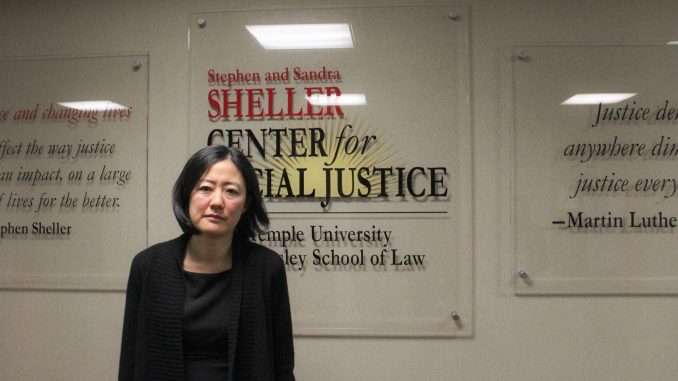
Jennifer Lee has two degrees from the Massachusetts Institute of Technology, but doesn’t do math or science anymore. She laughed as she remembered why her career path took such a strange turn.
“I think I sort of fell into it by accident,” she said. “I actually thought I was going to go into science, and then realized it was really hard.”
More than two decades later, she’s worked at the American Civil Liberties Union, been a farmworker attorney and written several academic articles on immigration and labor law.
“I ended up working with a professor as an undergraduate who did a lot of public policy work related to the healthcare field and got interested in public policy issues,” Lee said.
That professor, Jim Maxwell, is a key reason why Lee decided to attend Columbia Law School, she said. Now, Lee serves as a clinical professor of law at the Beasley School of Law, directing the social justice lawyering clinic in the Sheller Center for Social Justice, which was formed in Fall 2013 by Provost JoAnne Epps, who was the law school’s dean at the time.
At the clinic, Lee has mentored several students, guiding them through real-life cases of underserved clients. The students work on cases surrounding labor or immigration rights and employment law. The clinic and center are still being fine-tuned, Lee said.
She faces several challenges: the need for more students and employees, working out what the clinic’s defined mission is and trying to interact with more community organizations. One area, however, remains a strength: the students’ work ethic.
“People just roll up their sleeves and get their hands dirty,” Lee said. “They’re not daunted by the amount of work [or] the challenges that they face, they just take them on.
Two of those students are Tracie Johnson and Anthony Sierzega, both in their second year at the law school. They were partners this fall in Lee’s clinic, and said her instruction was invaluable to their understanding of how courtrooms work and the real-world law experience that came with it.
Johnson said Lee’s ability to mimic the opponent was what impressed her most.
“The way she can turn on that role and get very aggressive and give you that worst-case scenario … that is one thing that really surprised me,” she said. “She’s done it so long that she kind of has this wealth of ‘what’s to come,’ or ‘what could possibly happen.’”
Both Johnson and Sierzega are still working with Lee this semester because work with a client from the fall has carried onto the spring. Sierzega said Lee is easy to work for and learn from, and is “on top of” the multiple facets of her clinic and the center.
“[Lee] is making sure that all of the students are comfortable,” he said. “It’s real stuff that we’re doing, so it’s just making sure that things are going as smooth as possible and that students feel like they’re not getting bogged down on any issue.”
Lee’s commitment to providing real-life experience partially stems from her work as a farmworker attorney in Raleigh, North Carolina and Denver. She said she learned significantly from driving around between clients and listening to their issues.
“It’s really easy, I think sometimes, to get really wrapped up in the law, and the legal system and all the legal claims you can make,” Lee said. “There’s nothing like going out and being there and seeing things with your own eyes and talking to people who are living the experience.”
Len Reiser, program coordinator of the Sheller Center, said Lee’s commitment to low-wage workers and immigrants, along with her teaching ability, is what makes her successful.
“Teaching students who are actually representing people or organizations is a tricky business that not everyone knows how to do,” Reiser said. “Because the idea is to enable students to take maximum responsibility for basically providing legal services, but still providing the support and the oversight to make sure students are fully prepared for what they’re doing.”
Even with all her experience in reading, writing and practicing law, Lee said she still learns from her students, especially given recent news regarding actions by President Donald Trump.
“What students have taught me is how to be resilient in the face of challenging times,” Lee said. “Students have to want to fight the good fight, and get out there and make a difference in people’s lives. All of that is really inspiring for me.”
Steve Bohnel can be reached at steve.bohnel@temple.edu or on Twitter @Steve_Bohnel.


Be the first to comment